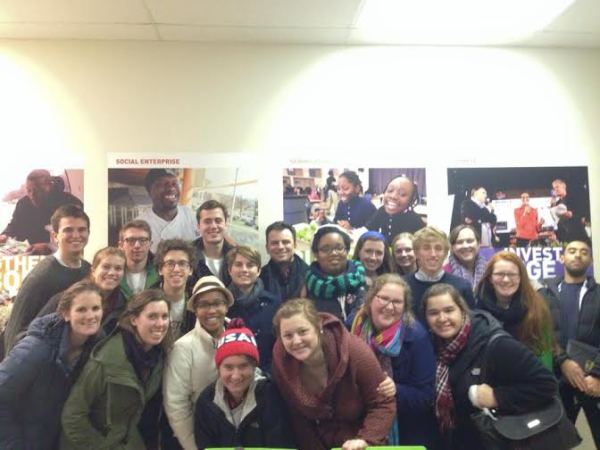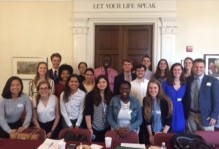Day 10 of 10: The Power of a Teacher
January 12, 2015: Our Last Lecture
“I know one thing I won’t miss—the Vornado. It’s like you’re walking and walking and still not there.”
Today we visited DC Central Kitchen (DCCK) where “it’s not about a hand out, but a hand up.” Professor Drew thought this would be the perfect place to wrap up our seminar because it’s where education and poverty meet. While the experience was lovely amidst breaking gloves, the struggles of raisin duty where only the few survive, and the satisfaction of helping to prepare over 5,000 balanced meals for the city, this article is about the unspoken hero of the program: Professor Drew Stelljes.
Prior to DCCK, we met at the DC Office for one last lecture where Drew stated how “it’s really easy for standards to become a limit” and encouraged us to affect change by dissolving the distance between ‘us’ and ‘them’. One of his hypotheticals was “what moves you to move others?” and he concluded with 20 tips for teaching he’d acquired throughout his career. The final chapter of our time together was what brought me to tears. Professor Stelljes shared how one of his teachers had personally influenced his life. This man was the type who told students they matter and “found the gifts in others rather than poking away at weakness”; “he practiced what he preached and he preached through his actions.” This man’s name was Dr. Warner and his philosophy was this:
It’s in every one of us to be wise, to listen, to serve others unselfishly, to love others unconditionally, and to laugh often.
Professor Stelljes wrapped up his lecture with bleak statistics about the disconnection between poverty and education. Kids still fail and poverty persists. Why is $7.25 an hour okay when the richest man makes $7,000 per minute? Why is charity applauded but justice is paralyzed? The fact of the matter is we celebrate those who succeed through poverty to make us feel better. As Diane Ravitch said, “Without a vision for society, any talk of reform is empty.” Is it not a bit unsettling to walk the marble floors of Congress after walking the broken floors of our students’ schools? He urged us to “Further flex your empathy muscle. Become the person who steers the conversation towards equality and justice.” And we believed him because, like his mentor, Drew practices what he preaches.
Throughout my 16 years of academia I have rarely met an educator with the same level of merit as Drew displayed over the course of 11 days. From the first impression back in Williamsburg, I had a hunch he would be a good professor but I could never have imagined what actually happened. Professor Drew is what every student wishes their teacher would be. He takes the time to get to know his students beyond their file and outside of the classroom. He lets his humanity justify his authority and doesn’t shy away from questioning. He stimulates discussion and challenges students to reconcile who they are and what they believe in. Through his alternative assignments, he forced us to not only formulate opinions grounded in facts supported by scholarly evidence but to articulate them with succinct precision.
He has the social intelligence to read the room and empathize with his students without compromising his authority. While we love him as a person, we respect him as an expert. Like his mentor, he found the unique gifts in each of us and took the time to praise them. Drew is the type of man who inspires you to do better, to live better, and to make him proud. He doesn’t ignite this response through gimmicks, manipulation, or reverse psychology, but by his unfiltered transparency and unyielding certainty in who he is, where he’s been, and what he stands for. Great guy, that Professor Stelljes.
P.S. I’d highly recommend this type of class (a highly concentrated seminar based on site visits with experts and heavy class discussion) for students of all levels because we can read about anything in a textbook but it’s not until you’re face-to-face with the subject do you truly understand it. Seminars like the W&M Winter in DC remove us from our comfort zones and compel us to replace the “us vs. them” barrier with simply ‘us’. As a society, this isn’t ‘their’ problem, it’s everyone’s problem.
~ Lynelle Haugabrook





No comments.
Comments are currently closed. Comments are closed on all posts older than one year, and for those in our archive.